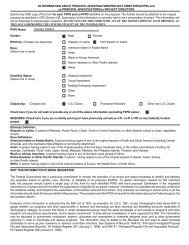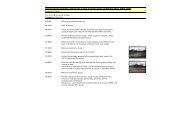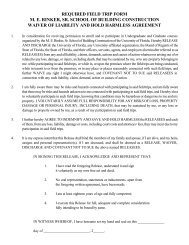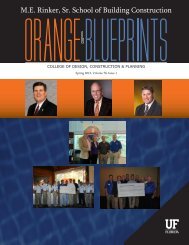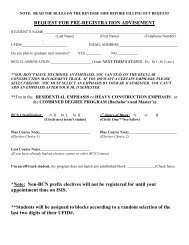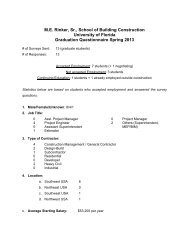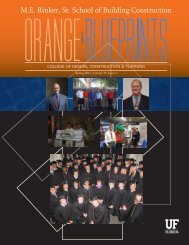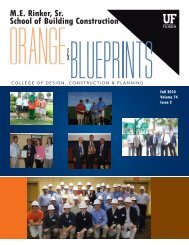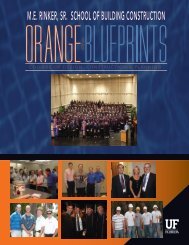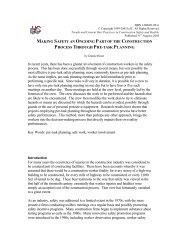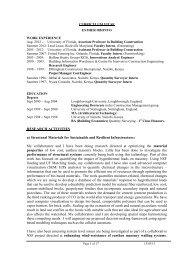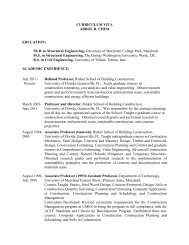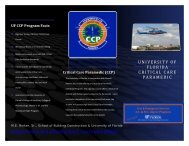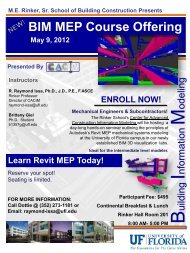Spring 2010 Volume 74 Issue 1 - ME Rinker, Sr., School of Building ...
Spring 2010 Volume 74 Issue 1 - ME Rinker, Sr., School of Building ...
Spring 2010 Volume 74 Issue 1 - ME Rinker, Sr., School of Building ...
Create successful ePaper yourself
Turn your PDF publications into a flip-book with our unique Google optimized e-Paper software.
Lessons Learned<br />
written by Dave Senko, Director <strong>of</strong><br />
Operations, Fluor Enterprises<br />
Delight Your Client<br />
Communication is the most important<br />
element in any relationship.<br />
Whether a spouse, co-worker, neighbor,<br />
pr<strong>of</strong>essor, superior, subordinate,<br />
client or subcontractor, communication<br />
is the avenue that drives the<br />
mutual success for whatever may be<br />
Dave Senko, BCN 1981<br />
involved. As for satisfying your client,<br />
that is “old school” and no longer sufficient.<br />
Clients expect to be fully satisfied<br />
as part <strong>of</strong> their contract or project; a ‘given,’ in other words. It is<br />
now necessary to delight, excite, teach, mentor, protect, and whatever<br />
else is needed to demonstrate you’re providing greater value.<br />
This does not necessarily require additional monies. In the business<br />
world (I do not recommend issuing a weekly memo to your spouse,<br />
albeit, in some cases it may actually help), I have found an easy way<br />
to build rapport with a client; client being a customer, owner, manager,<br />
or supervisor. Over the years, this has been very well received,<br />
without exception.<br />
Projects have reporting requirements outlined in the terms and<br />
conditions, scope <strong>of</strong> work, or otherwise designated by the client.<br />
Those, <strong>of</strong> course, need to be developed, updated, and transmitted<br />
as required. They typically include daily, weekly or monthly<br />
progress reports; safety statistics, schedules, cost reports, change<br />
orders, notices, submittals, and general correspondence typical <strong>of</strong><br />
most projects. This information is <strong>of</strong>ten voluminous and cumbersome,<br />
sometimes to the point <strong>of</strong> being unusable or at least difficult<br />
to summarize for any practical use. It can be hard to find errors and<br />
the worst part is they are usually sent with the slight touch <strong>of</strong> a print,<br />
enter, or send key. I do not want to undermine the importance <strong>of</strong><br />
detailed reporting (as they say, the devil is in the details!). However,<br />
the more difficult part, <strong>of</strong>ten overlooked, is the timely interpretation<br />
and summarization <strong>of</strong> that information into a state whereas needed<br />
action items, recovery plans, or adjustments to execution, etc. can<br />
be implemented quickly for maximum benefit.<br />
In addition to all required communication, a simple communication<br />
technique has been very effective for me. It is common for managers<br />
to attend and report on their responsibilities in a weekly meeting,<br />
<strong>of</strong>ten times early on a Monday morning. On large construction<br />
projects, the pace is hectic, <strong>of</strong>ten involves weekend work, and as<br />
BCN Grand Guard - Class <strong>of</strong> 1959<br />
Congratulations to the following 1959 BCN alumni who were inducted<br />
into the University <strong>of</strong> Florida Grand Guard Friday, November<br />
20, 2009. The events <strong>of</strong> the Grand Guard Weekend included tours<br />
<strong>of</strong> Oak Hammock and the University, lunch at the <strong>Rinker</strong> <strong>School</strong> and<br />
the Gators vs. Florida International University football game. These<br />
BCN alums were inducted at a ceremony held at the J. Wayne Reitz<br />
Union that concluded with dinner and dancing.<br />
such is difficult for a manager to report on his activities in an early<br />
Monday morning status meeting with their superiors and peers.<br />
By providing a simple bulleted memo, in electronic form easily<br />
received on a laptop or blackberry, your senior client representative<br />
can walk into his meeting with pertinent topics to report. He<br />
will ‘look good’ and be able to report timely with brevity and confidence.<br />
Some key benefits include:<br />
• Information is concise, very current, and drafted so he can be<br />
“well-informed.” There can be items that make him look good – to<br />
show ‘he is on top <strong>of</strong> things’!<br />
• Being issued directly from senior manager to senior manager, it<br />
is reliable.<br />
• Over time, you and your client will become more <strong>of</strong> a team, supporting<br />
each other to success.<br />
• The ‘informal’ memo can serve as support for an <strong>of</strong>fensive or<br />
defensive claim if needed; after all, you reported to him, and he<br />
reported to his superiors on a regular and timely basis. Of course,<br />
when pertinent, <strong>of</strong>ficial correspondence should also be provided.<br />
• The perception <strong>of</strong> your performance will improve as well your<br />
reputation.<br />
• Helps you to maintain focus on important milestones, issues and<br />
objectives.<br />
• If you blind copy this memo to your direct reports, it provides additional<br />
reminder <strong>of</strong> committment.<br />
Some requirements include:<br />
• Must be at the end <strong>of</strong> the week or very near thereto, can be Friday<br />
afternoon or Sunday evening, and must be done consistently.<br />
• Need to include both positive and negative items; properly worded<br />
to direct accountability.<br />
• Must be concise bullets focusing on safety, milestones, major<br />
starts, major completions, problems or other topics important to the<br />
project, or the ‘concern <strong>of</strong> the day.’<br />
• Must be one page, from you, to him, list activities for that week<br />
ending and list activities planned for the following week. No more<br />
than 4-6 bullets for each week.<br />
If you would like to submit an article for<br />
the “Lessons Learned” section <strong>of</strong> the newsletter,<br />
please contact Kim Stanley at<br />
kimms@ufl.edu.<br />
(L-R) Bob Claudy, Bill Ayers, Joe Brown, Dr. Chini, Bob Bird,<br />
George Austin, Curtis Culver, Wink Jackson<br />
11



